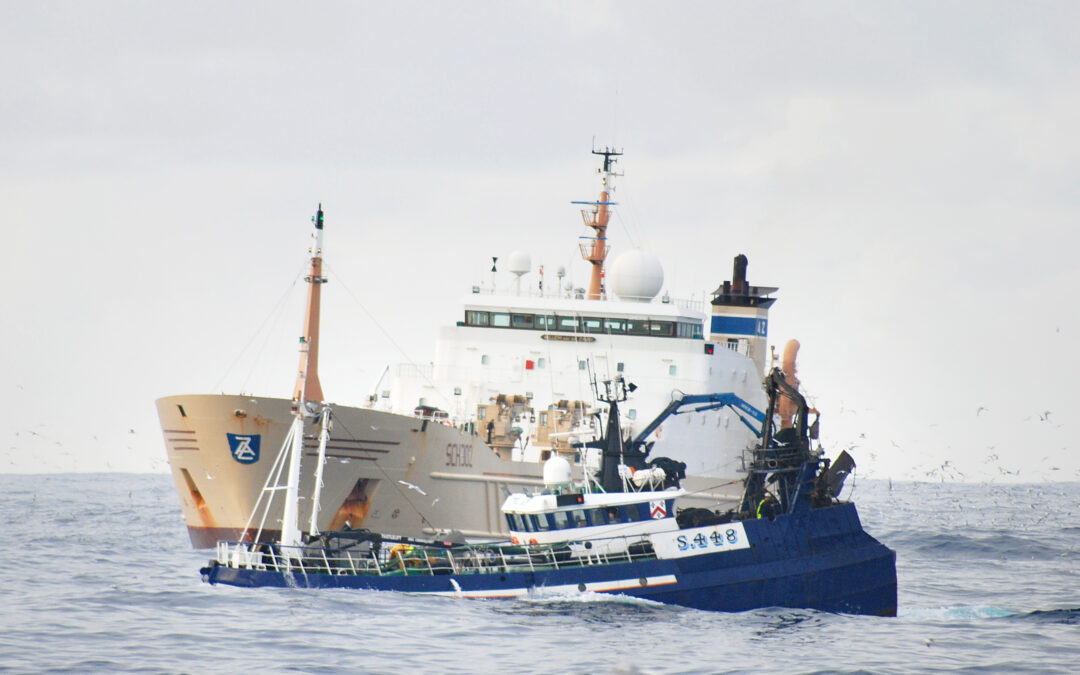If non-EU countries want to fish in Irish waters, then they must face the same control and conservation regime as the Irish fleet. Otherwise, all of the fish species they catch may not be recorded which affects stocks, conservation and sustainability, say Irish fishing industry leaders.
Irish Fish Producers Organisation (IFPO) chief executive, Aodh O Donnell, says Ireland has a “land-based not sea-based processing sector. We rigidly monitor, report and fully account for mixed species in our catches – not just those which a vessel sets out to catch. But we have concerns that non-EU fishing vessels currently don’t always report ‘by-catches’, (species caught accidentally), which has major implications for fish conservation and sustainability.
“For example, if an Irish vessel fishing for mackerel catches whitefish species in their nets, this ‘by-catch’ has to be logged, recorded and counted as part of their quota. We have concerns that this is not the case for non-EU vessels which don’t land the fish they catch in our waters in Irish ports.”
“At the same time, a strict conservation driven approach to control is applied to the Irish industry. This necessitates heavy capital investment by the Irish Industry in best-in-class modern live feed monitoring technologies.”
“If Norway and other non-EU countries want access to Irish waters, then part of the deal must be that they submit to the same controls for by-catches. Otherwise, we are endangering conservation and putting the Irish fleet at an operational and competitive disadvantage.
“The EU is negotiations with Third (non-EU) Countries like Norway and Iceland about access to Ireland’s EU waters. This access proposal is a highly sensitive issue for our members. Any such arrangements must require strict adherence by Third Country vessels to a fully harmonised level of species reporting. This is vital for long term sustainability reasons and to maintain the fish landing obligations of the Common Fisheries Policy (CFP.)’’
The Irish Fish Processors and Exporters Association (IFPEA) fully support the IFPO position. IFPEA chief executive, Brendan Byrne says Ireland must “stand firm and clearly state that factory ships for processing catches at sea are not welcome into the Irish EU waters. This must be fundamental to any new arrangements made between the EU and Third Countries.
“Norwegian and Icelandic vessels press hard for access to the EU-Irish Exclusive Economic Zone (EEZ) to catch their enormous self-allocated quotas. These Norwegian vessels catch huge volumes of blue whiting in our waters each year. In fact, Norwegian fishing opportunities to catch their quotas are five times greater than what Ireland is permitted to catch in our own waters.
These foreign vessels cannot pretend to have ‘clean’ fisheries or avoid fully accounting for their by-catches. In the interest of sustainability and good ocean governance, we need effective measures agreed at EU level and implemented by Ireland to ensure that third country vessels comply fully with Point of Entry and EU Control and Enforcement provisions. In particular, we need strict requirements for sampling and speciation of their enormous catches in the Irish EEZ.”
The Irish South and West Fishermen’s Producer Organisation (IS&WPO) says Ireland’s valuable waters must be protected in the long-term national interest. IS&WPO chief executive Patrick Murphy says the resilience of our peripheral coastal communities “is largely dependent on this traditional sector. Access deals for Third Countries must take account of a fit for purpose control and enforcement regime by our authorities. We are at a crossroads and a radical state led change in approach is required.”
“This is a priority as otherwise we have too much to lose. Any access deal to fish in our waters must include a suite of additional comprehensive control procedures that take account of mixed species realities.’’
Aodh O Donnell says Ireland’s “rich maritime space is heavily exploited by other players. This is a sustainable resource requiring effective harmonised management and control. This monitoring, control and vessel inspection process is coordinated with our authorities by the European Fisheries Control Agency (EFCA) in Vigo Spain. The effective application of control procedures to Third Country users is a key concern
Good ocean governance is in the EU and international community’s long-term interest and third country agreements need to reflect this. We need clarity about how controls will be applied and what resources will be deployed to effectively control Third Country vessels.
“We have good reason to be concerned that our vessels are reporting by-catches but third country vessels are not always doing so. We call on the control and enforcement authorities to urgently implement new harmonised protocols in the coming year’’.


Recent Comments